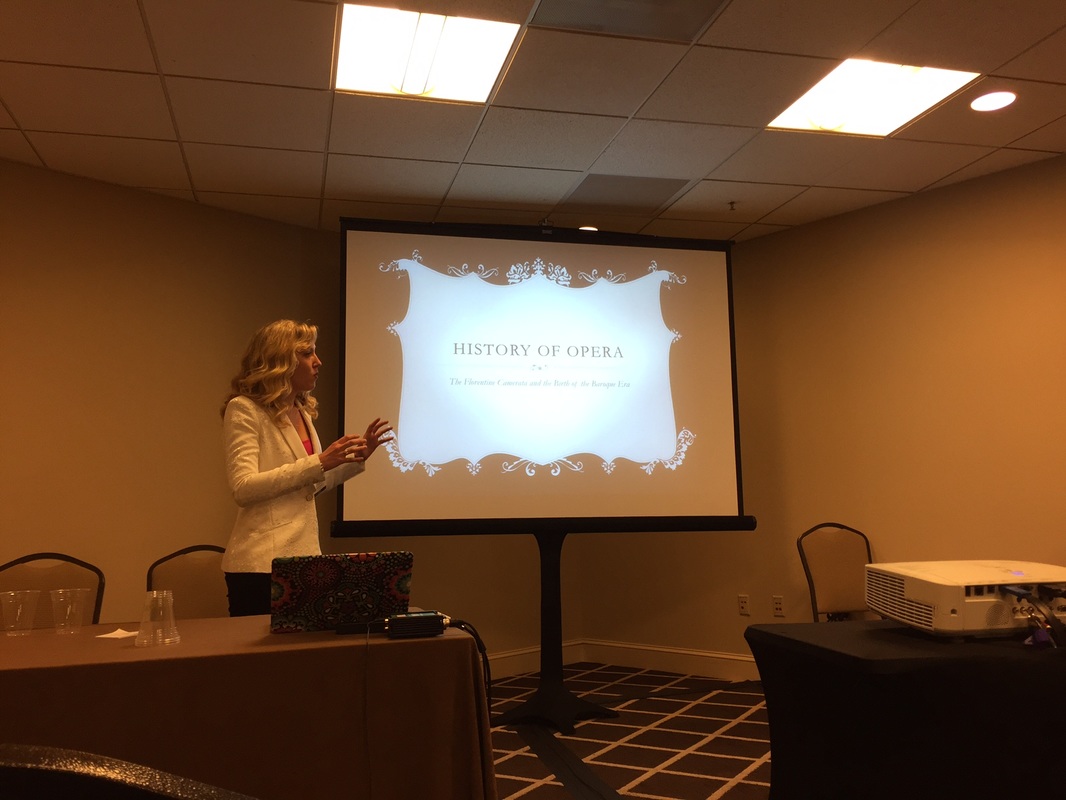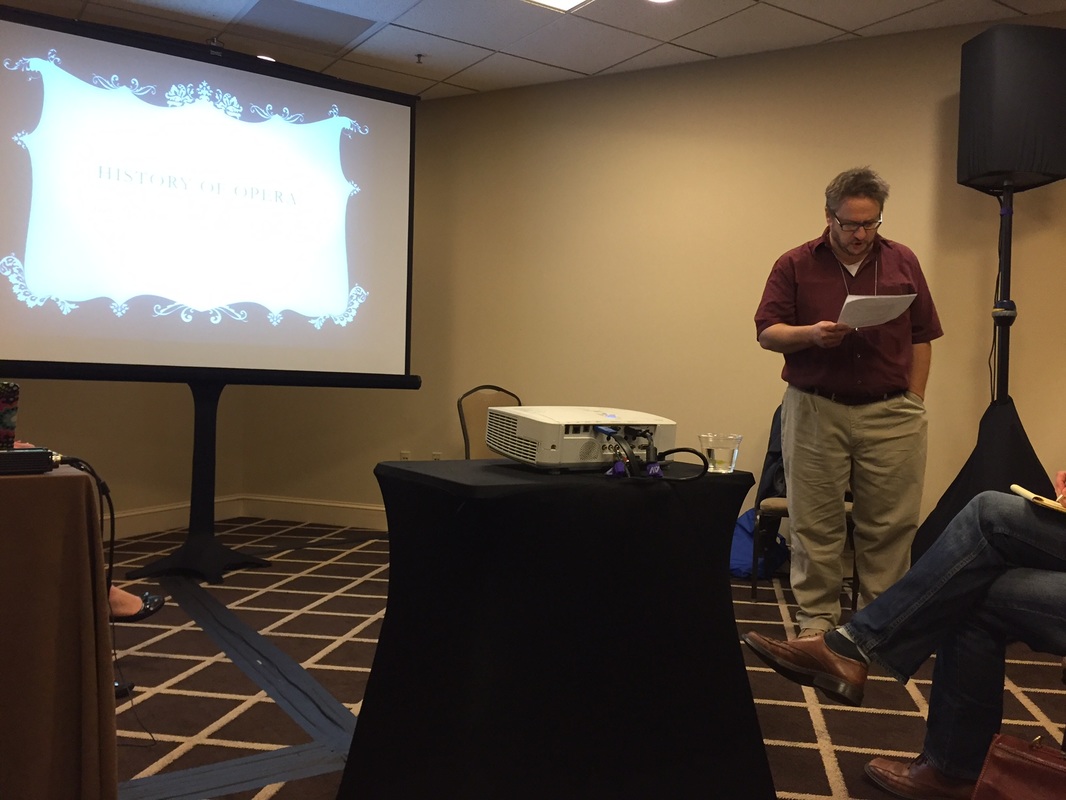“In the humanities sequence we’re supposed to teach art, but most of us only do the plastic arts - painting, sculpture, architecture - we don’t focus on performance art. We do what we’re more comfortable with,” Powell said. “I thought if I’m always suggesting to my students to expand beyond their horizons and search out new opportunities to experience the arts, then why was I not doing the same? I need to stretch myself in the same way I ask my students to stretch themselves.”
Powell first became interested in opera while teaching a course on German philosopher Friedrich Nietzsche, who was friends with the famous German composer Richard Wagner.
“That’s where I really got the idea of maybe teaching something with opera. But I knew I didn’t know anything,” Powell said.
He began reading up on the art form, but ultimately decided to begin reaching out to music students for help. When he presented the opportunity to Weingart during last fall’s Curriculum Crash Course, she jumped at the opportunity. Weingart, who has been training as a classical singer since age 12 and studying music since age 5, was enthusiastic to share her love of opera with other students.
“I’ve always regarded [opera] as this very prestigious art form. And then when I started learning some of the historical aspects of it that was even more fascinating,” Weingart said.
The next semester, spring 2016, Weingart began leading small 25-30 minute lectures once a week for Powell’s 202 course.
“[Jason] basically said, ‘teach them, teach me, and let’s see what we can do with this.’ It was a big experiment,” Weingart said.
The pair were both nervous. This was Powell’s first experience co-teaching with a student and Weingart was worried the students would not receive her or the material well.
“I was expecting them to find it kind of dull,” Weingart said, “and I was expecting them to be upset that I was taking away from the time they could have with Jason and learning from Jason.”
The reviews, however, have been overwhelmingly positive. Powell said that both in person and on course evaluations the students frequently mentioned how much they enjoyed having Weingart in class.
“You could get a sense that as a fellow student they’re rooting for her because they understand how hard this was going to be. It built up a sort of camaraderie between the class and Val in a fun way,” Powell said. “My students weren’t afraid to tell me afterwards that they’d rather have Val teaching some stuff.”
The feeling was mutual. Weingart said that her time with Powell’s class had reinforced that teaching at the collegiate level is what she wants to do once she graduates.
“It’s so refreshing, because being a musician for as long as I have been, stuff doesn’t take me by surprise anymore. It’s so interesting to watch [the students’] reactions, because a lot of them are so completely unfamiliar with this whole thing,” Weingart said.
Powell agrees that Weingart has found her calling, saying, “Val is very gifted and sharp, and she’s going to make an excellent teacher in her future.”
The only issue Powell and Weingart have experienced throughout this experiment was integrating opera smoothly into the rest of the literature heavy humanities sequence.
“I was just adding on to Jason’s class, but I wasn’t really meshing with it. I was this weird outlier,” Weingart said.
Powell and Weingart parlayed this road block into Weingart’s senior Honors thesis and the two are now working to develop an Honors 202 course that combines opera history with the other topics of the humanities sequence.
“Instead of having a baseline of all this literature and philosophy and throwing opera on top of that, what wanted to find out what would it be like to flip it.” Powell said. “We let opera sort of call the thematic shots.”
Weingart said that her ultimate goal for this course would be to remove the stigma of stuffiness and mystery from opera and make it more accessible to everyone.
“The main goal of what I’m designing is that the person teaching it does not have to be a musician or have musical background in order to teach it effectively, and the students don’t need to have a musical background in order to learn it effectively,” Weingart said. “I think by learning the history and what it [opera] was designed to do and the people it was designed to effect and the issues that are prevalent in some of the operas it becomes something they can embrace.”
Weingart’s syllabus is nearly complete, and she and Powell traveled to Seattle, WA earlier this month to present their work at the National Collegiate Honors Council (NCHC) Conference. Powell hopes to beginning implementing this syllabus for his courses starting in spring of 2018. He is also hoping that Weingart will be willing to come back to help him launch the course.
“It’s been wonderful to do something new that I felt good about doing because I had someone so confident working with me,” Powell said.
Until then, students can begin getting their feet wet with opera by attending the two productions The School of Music will be putting on later this year. The first will be Beatrice aet Benedict on Thur, Dec 1 and Sat, Dec 3 in Pruis Hall. The second will be The Marriage of Figaro - Weingart’s favorite - in Sursa Hall on Fri, March 31 and Sun, April 2.
“It’s all students performing, so it’s another step to taking the fear and mystery out of going to an opera because it’s in a familiar space with familiar people,” Weingart said.
If December is still too far away, News and Notes can offer you this opera fun fact from Weingart: Legend has it that Mozart didn’t write the overture to his opera Don Giovanni until the morning of the premiere.



 RSS Feed
RSS Feed
